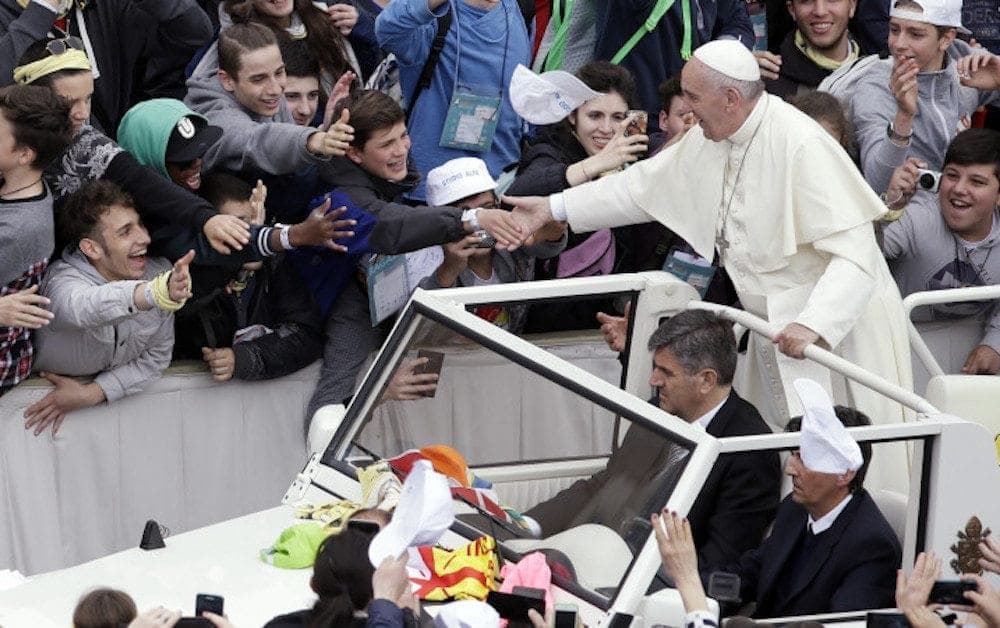ROME— Pope Francis on Tuesday called Catholic priests in Latin America to remember they serve the laity, and not the other way around, describing clericalism as one of the strongest challenges that the Church faces.
He also accused the Catholic hierarchy on his home continent of generating a “laical elite,” formed by those who work in the “things of the Church,” instead of helping ordinary baptized people live their faith in everyday situations.
“I remember the famous expression: ‘It is the hour of the laity,’ but it seems that the clock has stopped,” he said. “Watching the People of God is to remember that we all entered the Church as laity.”
“It’s never the shepherd who tells the laity what they have to do or say [in public life], they know it as well or even better than us,” Francis wrote in a message to Canadian Cardinal Marc Oullet, who heads the Vatican’s Congregation for Bishops and is also President of the Pontifical Commission for Latin America.
“Our role, our joy, the joy of the shepherd is precisely in helping and stimulating, as many did before us, so that it’s the mothers, the grandmothers, the fathers who become the true protagonists of history,” Francis wrote.
Helping the laity to become the real protagonists, he said, is not a “a concession of our good will,” because it’s their “right.”
“The laity are a part of the holy, faithful people of God, and for this reason, the protagonists of the Church and the world, whom we’re called to serve and not by whom we’re to be served,” Francis wrote.
The pope’s letter was a follow-up to a plenary assembly of the Pontifical Commission for Latin America, which took place earlier in the year under the theme, “The indispensable role of the lay faithful in the public life of Latin American countries.”
Francis, history’s first pope from the global south, wrote that it’s not possible to talk about the laity while ignoring “one of the strongest problems that Latin America has to face – and I ask you to pay special attention to this – clericalism.”
Clericalism, the pope continued, “nullifies the personality of Christians” and it also “leads to the functionalization of the laity, treating them as ‘errand boys [or girls]’.”
Catholicism in Latin America, as Francis noted in his letter, is wildly diverse, but one of its main features is popular expressions of faith, including both popular Marian shrines in Mexico, Brazil, and even in the pope’s own Argentina, as well as the “base communities” that were the backbone of liberation theology.
Francis commended this popular level of faith, describing it as a “very interesting phenomenon” and one of the few places where the faithful were “sovereign of the influence of clericalism.”
Quoting an apostolic exhortation from Paul VI, Evangelii Nuntandi, the pontiff admitted this populist faith has “its limits” and is frequently exposed to distortions, but said “when it is well oriented, above all by a pedagogy of evangelization, it contains many values.”
“It reflects a thirst for God that only the simple and poor can know,” Francis wrote.
But the Church in this region, the pope suggested, is also marked by a strong form of clericalism, which some observers define as the inevitable result of Catholicism having been effectively a state-imposed monopoly until quite recently.
Latin America still holds 40 percent of the total Catholic population, and in some countries, such as Paraguay, 90 percent of the total population defines themselves as Catholic.
However, in recent years the Church in Latin America has sustained massive losses due to the twin onslaughts of secularism and Pentecostalism, tied with a strong clericalism where clergy see themselves as political power brokers. The Church projects an image of power and privilege, and the role of the laity is seen in a passive “pray and obey” manner.
The pope warned the hierarchy against the temptation of believing that a “committed lay person” is she or he who does the work of the Church or things for the parish or the diocese.
“Without realizing it, we’ve generated a ‘laical elite,’ believing that commitment is working on priestly things and have forgotten, neglected the believers often burning their hope in the daily struggle of living the faith,” he said.
The Church, Francis wrote, must recognize the lay person “for their own reality, for their own identity, for being immersed in the heart of social, public and political life.”
In his letter to Oullet, Francis also called the local hierarchy to look at the “People of God” to avoid certain “slogans” that fail to sustain the life of the Catholic communities.
According to Argentine Theologian Father Juan Carlos Scannone, Francis instinctively rejects any distinction between social activism on behalf of the poor and the Church’s traditional doctrine or liturgy, since the poor are generally the most strongly devoted to both Church teaching and pious devotions.
If you care for the poor, in other words, you also have to care about their faith, and he said as much in the letter the Vatican made public Tuesday.
“An evangelized popular culture contains values of faith and solidarity capable of encouraging the development of a more just and believing society, and possesses a particular wisdom which ought to be gratefully acknowledged,” the pope wrote.
Complaining that many cities on the continent have become “real places of survival,” with people “seeking the Lord and trying to give testimony,” Francis said pastors are called to work particularly for and with the poor, looking for ways to promote efforts already being made to “keep hope and faith alive.”
The pope also called the Church to recognize that the pace of everyday life is much faster than 30 years ago, which requires “imaginative spaces for prayer and communion,” particularly in the cities, “according to places, times, and people” and not in a “uniform” way.















